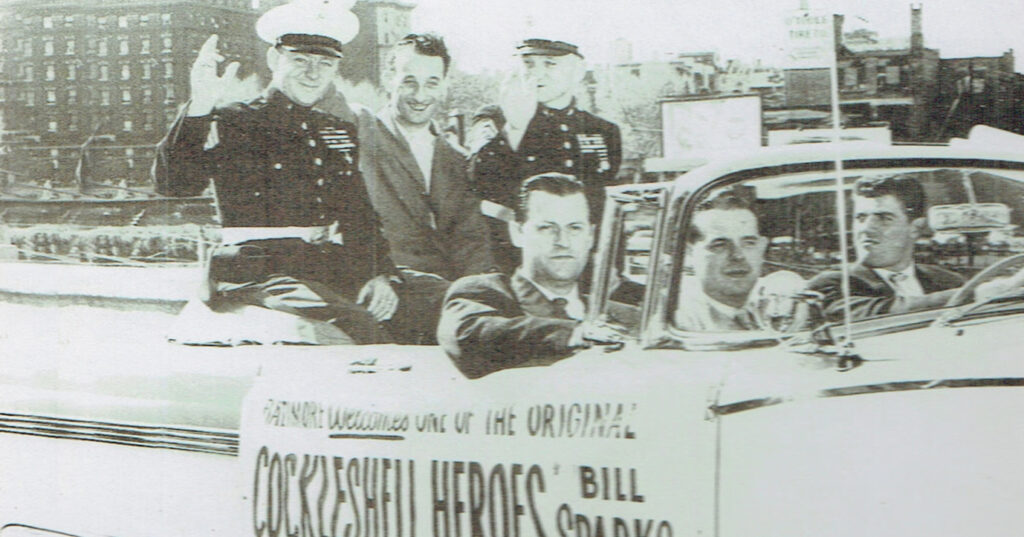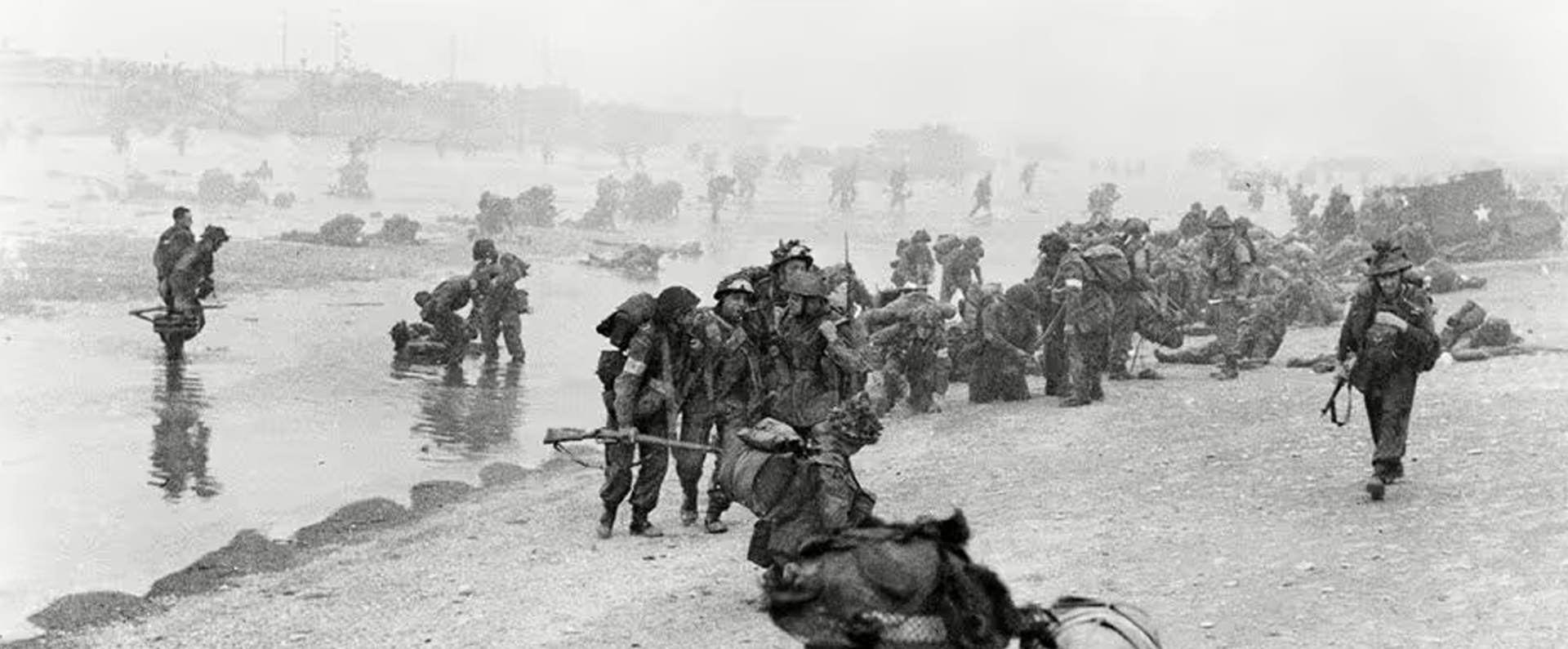
Published in Britain at War in June 2021.
Corporal William Edward Sparks DSM
It was a chilly evening in November 1955. The world première of the film The Cockleshell Heroes had attracted a long list of dignitaries, including HRH The Duke of Edinburgh. The guests also included Earl Mountbatten of Burma who, as Chief of Combined Operations, had approved the medal recommendations for one of the most daring raids in British military history, which was now being brought to the big screen for the first time. Most important of all, perhaps, the two surviving ‘Cockleshell Heroes’ took star billing at the première.
The remarkable, real-life events highlighted in the film had taken place 13 years earlier. World War Two’s Operation Frankton was a commando-style raid on ships in the German-occupied port of Bordeaux in southwest France. It was carried out in canoes by a small unit known as the Royal Marines Boom Patrol Detachment (RMBPD).
The two survivors were Major Herbert ‘Blondie’ Hasler, who had devised the audacious raid, and Corporal William ‘Bill’ Sparks, who had accompanied the officer in his canoe on their daring mission. It was the gallantry and service medals awarded to Sparks that formed my first purchase for such Commando or Special Forces-type operations and I feel hugely privileged to be the custodian of his medal group. I bought his awards at auction in 1988 and to this day, I find the raw courage and daring exploits of Sparks and his comrades utterly astonishing and deeply moving.
William Edward Sparks, the son of a serving seaman, was born in London’s East End on September 5, 1922. A slightly built Cockney with an infectious laugh, he left school at 14 and worked as a shoe repairer until the outbreak of the war in September 1939. His father had wanted his son to follow him into the Royal Navy, but young Bill opted instead to join the Royal Marines.
Able and brave, Sparks found himself, by mid-1942, chosen for a role as one of a dozen men who Hasler said would need to be “eager to engage the enemy; indifferent to their personal safety; intelligent; nimble; free from family ties or dependents; able to swim; and of good physique and eyesight”.
Sparks ticked all these boxes in spades. The men spent the late summer of 1942 lodged in boarding houses in Plymouth, Devon, their mission shrouded in total secrecy, even from themselves.
As the training got underway, there were many teething problems with canoe design and other equipment but Hasler, who was to lead the raid, was impressed with the dedication of his men. Early on, it seems, Hasler chose Sparks as his likely number two.
The aim was to reach the mouth of the Gironde in a submarine that would then surface in darkness. The 12 men chosen for the mission would transport eight limpet mines in each of the lockers of their six Cockle Mark II canoes – selected as the most suitable vessels for the planned three-day trip up two rivers. Next, the men’s task was to plant their charges below the waterline of some twelve merchant ships, scuttle their canoes and then escape through occupied France to Spain.
In his book British Special Forces, William Seymour writes: “There was nothing new in hit and run raids from submarines, but what was new in Operation Frankton was the deep to make – some 75 miles upriver – and the fact that it was considered impossible to arrange any means of picking the men up after they had completed the task.”
The men and their equipment were packed into the submarine HMS Tuna, which left the Clyde on November 30, 1942. Even as they travelled towards France, Hasler kept up the secrecy of the mission and declined to tell his men exactly what they were doing. Eventually, he had to unveil the plan. “Right, lads. This is it. The real thing,” Hasler told his attentive audience.
Shortly before 8pm on December 7, and after a 24-hour postponement because of bad weather, the submarine surfaced and the six Cockles were lowered into the Bay of Biscay. However, in the course of getting the Cockles on deck in the darkness, one was damaged.
Reluctantly, Hasler told its crew they would have to stay behind. The 12-man mission was now a ten-man operation with five Cockles – Hasler and Sparks in Catfish, and the remaining eight in Crayfish, Conger, Cuttlefish and Coalfish. At 8.22pm, beneath a star-filled sky, the captain of Tuna bade farewell and good luck to “a magnificent bunch of blackfaced villains”.
The strong shore defences and searchlights meant the submarine had to deploy the Cockles in open seas, three full miles from the mouth of the Gironde estuary. Unfortunately, the Atlantic swell increased alarmingly until, after three hours of paddling, the five Cockles were hurled into a tidal race. In the subsequent confusion, Coalfish disappeared and, although the others waited, she never turned up. The operation was now down to just eight men in four Cockles.
Shortly after the tidal race ended, they found themselves in 5ft high waves. Conger was damaged and Hasler ordered the craft scuttled. Her crew clung desperately to the sterns of Catfish and Cuttlefish. With no chance of clambering aboard either, they were given a tow towards land – but only so far. Hasler spoke to the two men. “I’m afraid this is as far as we can take you… God bless you both.”
Both men, already frozen from the December waters, apparently failed to reach land.
There were now only six men and three Cockles – half the party that had set out – left to continue the mission.
Hasler’s immediate aim was to pass the Verdon jetty and get into the river proper, in the course of which they became separated from another Cockle, Cuttlefish. The raiding party was down to just four men and two Cockles. Sparks later wrote: “It began to look as though the operation was doomed to failure.”
The next day began badly when their overnight hide was spotted by French fishermen. Hasler chose to reveal their identity and rely on the fishermen’s discretion. Much worse, however – and unknown to Hasler and his three men – the Germans had detected HMS Tuna just hours after the submarine had dropped off the men.
German suspicions that something was up were confirmed when they captured the two Marines from the first Cockle, Coalfish, that had lost its bearings in the tidal race. The whole area was now on full alert and swarming with Germans on the look-out for the rest of the party.
But over the next day, the remaining four made good progress; soon the Gironde was behind them and they were in the Garonne river. Their target lay just 12 miles ahead.
Soon after, they were in the position to carry out the attack. Hasler ordered that the limpets should be armed and at 9pm on December 11 they started the time fuses. At 9.15pm, the four shook hands and the two Cockles slipped silently into the harbour. “Now nothing would stop these mines going off in about nine hours’ time,” Sparks later recalled.
After attaching the mines to several ships, the four men split into pairs to try to make their escape. “See you in Granada [Spain]. We will keep a couple of pints for you,” Sparks shouted to his two comrades. The next morning Hasler and Sparks listened for the sound of mines exploding but could hear nothing.
At home, military leaders had received no news of the ten Marines and, indeed, as late as January 1943 all were still posted as missing.
Hasler and Sparks had, in fact, undertaken a long and tortuous journey, hiding out night after night and eventually seeking help from the French Resistance. They eventually reached Barcelona, then
went on to Madrid, finally arriving in British-owned Gibraltar on April 1, 1943. Their four-month adventure was over, Sparks and Hasler were the only survivors from the raiding party.
Writing on April 29, Chief of Combined Operations Louis Mountbatten detailed to the Admiralty a “brilliant little operation” that he considered to have been “carried through with great determinism and courage”. Sure enough, the London Gazette announced on June 29 that Sparks had been awarded the Distinguished Service Medal (DSM) and Hasler the Distinguished Service Order (DSO). Unwilling to give away secrets to the enemy, there was only a general citation acknowledging the “courage and
enterprise” of both men.
Sparks would serve with distinction in Burma, North Africa and in Italy. Shortly after the war ended, it was established that five ships had been badly damaged by mysterious explosions on the morning of
December 12, 1942. It also emerged that two of the Cockleshell raiders had died from hypothermia and the six others had been caught and executed. Moreover, in 2010, it was claimed a sixth vessel was also damaged by mines placed during
Operation Frankton.
After leaving the Royal Marines, Bill Sparks did various jobs including working as a bus driver and for the Malay police force. It was while he was working in a plastics factory that he got a call at home from Cubby Broccoli, the film director, saying he wanted to make a film about the ‘Cockleshell Heroes’, calling the movie by the same name. Sparks became a consultant for the film, along with Hasler. At the film’s première in Leicester Square, Sparks had “quite a chat” with Prince Philip. He later attended premières in France and the United States.
After the war, Sparks became increasingly incensed that his RMBPD comrades on the mission, who had given their lives, had not been decorated. Two men had been Mentioned in Despatches but that was the sole official recognition of the bravery of the eight men who had died. Sparks was told that only the Victoria Cross could be awarded posthumously, and even that required the act of bravery to be witnessed by a senior officer. His petitions, lobbying of MPs and even a plea to the Queen for the others to be decorated came to nothing.
Eventually, an appeal was launched to build a monument for the Cockleshell Heroes. The Daily Telegraph arranged a fund and soon there was enough to build a memorial. It was erected in the barracks of the Royal Marines’ Special Boat Squadron (SBS), in Poole, Dorset, and unveiled in 1983.
Sparks eventually wrote two books about his exploits and ended his second book with the words: “I continue to do my best to keep alive the memory of those who paid the supreme sacrifice during those black days in December 1942. They are the ‘Cockleshell Heroes’. I am merely the proud spokesman for these exceptionally brave men.”
Sparks had three sons and a daughter by his first wife, Violet, who died in 1982. His second wife, Irene, survived him when he died on November 30, 2002, aged 80.
Download a PDF of the original Britain at War article
For more information, visit:
LordAshcroftOnBravery.com


